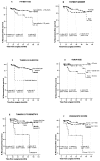Early recurrences in histologically benign/grade I meningiomas are associated with large tumors and coexistence of monosomy 14 and del(1p36) in the ancestral tumor cell clone
- PMID: 17704362
- PMCID: PMC1994101
- DOI: 10.1215/15228517-2007-026
Early recurrences in histologically benign/grade I meningiomas are associated with large tumors and coexistence of monosomy 14 and del(1p36) in the ancestral tumor cell clone
Abstract
Tumor recurrence is the major clinical complication in meningiomas, and its prediction in histologically benign/grade I tumors remains a challenge. In this study, we analyzed the prognostic value of specific chromosomal abnormalities and the genetic heterogeneity of the tumor, together with other clinicobiological disease features, for predicting early relapses in histologically benign/grade I meningiomas. A total of 149 consecutive histologically benign/grade I meningiomas in patients who underwent complete tumor resection were prospectively analyzed. Using interphase fluorescence in situ hybridization, we studied the prognostic impact of the abnormalities detected for 11 different chromosomes, together with other relevant clinicobiological and histopathological characteristics of the disease, on recurrence-free survival (RFS) at 2.5, 5, and 10 years. From the prognostic point of view, losses of chromosomes 9, 10, 14, and 18 and del(1p36) were associated with a shorter RFS at 2.5, 5, and 10 years. Similarly, histologically benign/grade I meningiomas showing coexistence of monosomy 14 and del(1p36) in the ancestral tumor cell clone displayed a higher frequency of early relapses. In fact, coexistence of -14 and del(1p36) in the ancestral tumor cell clone, together with tumor size, represented the best combination of independent prognostic factors for the identification of those patients with a high risk of an early relapse. Our results indicate that patients with large histologically benign/grade I meningiomas carrying monosomy 14 and del(1p36) in their ancestral tumor cell clone have a high probability of relapsing early after diagnostic surgery. These findings suggest the need for closer follow-up in this small group of patients.
Figures

References
-
- Fewings PE, Battersby RD, Timperley WR. Long-term follow up of progesterone receptor status in benign meningioma: a prognostic indicator of recurrence? J Neurosurg. 2000;92:401–405. - PubMed
-
- Hsu DW, Efird JT, Hedley-Whyte ET. MIB-1 (Ki-67) index and transforming growth factor-alpha (TGF alpha) immunoreactivity are significant prognostic predictors for meningiomas. Neuropathol Appl Neurobiol. 1998;24:441–452. - PubMed
-
- Maes L, Kalala JP, Cornelissen M, de Ridder L. P CNA, Ki-67 and hTERT in residual benign meningiomas. In Vivo. 2006;20:271–275. - PubMed
-
- Perry A, Stafford SL, Scheithauer BW, Suman VJ, Lohse CM. The prognostic significance of MIB-1, p53, and DNA flow cytometry in completely resected primary meningiomas. Cancer. 1998;82:2262–2269. - PubMed
Publication types
MeSH terms
LinkOut - more resources
Full Text Sources

